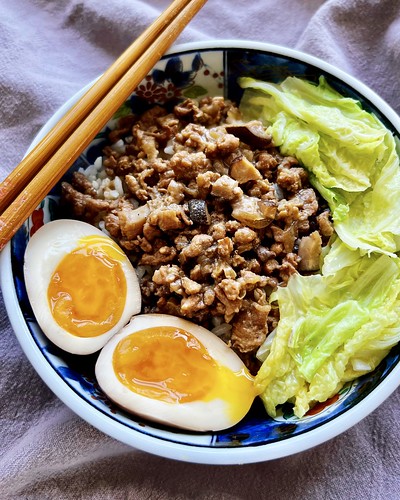The kind of lu dan I grew up eating was made from eggs that had been hard boiled, peeled, then dropped into a vat of red-braising meat, like Taiwanese beef noodle soup or braised pork. I still love those kind of eggs, but nowadays I prefer my egg yolks to be jammy instead of hard and chalky.
When I discovered the recipe for Momofuku soy sauce eggs several years ago, I was delighted to be able to make the kind of eggs I was dreaming about (and without needing to make a pot of braised meat to do it!). This version is heavily influenced by that recipe but adapted for 4 eggs, which fits perfectly in one of those pint-sized plastic deli containers. You can save the marinade in the refrigerator and reuse it for another batch of eggs.
Serve these eggs with the aforementioned Taiwanese beef noodle soup or braised pork over rice or just about anything with noodles (ramen!) or rice (Taiwanese pork chops!). I also like to snack on them by adding a squirt of Kewpie mayonnaise (and maybe a smattering of chopped chives if I'm feeling fancy) to imitate deconstructed deviled eggs.
Soy-Marinated Jammy Eggs (滷蛋)
makes 4 eggs
4 large eggs, straight from the refrigerator
4 tablespoons hot water
1/2 tablespoon sugar
1 teaspoon rice vinegar
6 tablespoons soy sauce
1/8 teaspoon Joy's Five Spice
Bring a pot of water to a boil and add the eggs. Cook for exactly 7 minutes. In the meantime, prepare an ice water bath and make the marinade.
In a pint-sized plastic deli container, dissolve the sugar in the hot water, then add the rice vinegar, soy sauce, and five spice powder.
When the 7 minutes are up, immediately transfer the eggs to the ice bath. Once the eggs are cool enough to handle, crack all over with the back of a spoon and return to the ice bath (the water from the ice bath helps with peeling the egg). Carefully peel the eggs, then transfer them to the marinade. Place a piece of paper towel on top of the eggs so that the marinade covers the top of any eggs that peek out.
Marinate for at least 3 hours and up to overnight. Remove from the marinade and keep the marinade in the fridge for the next batch. Serve the eggs immediately or keep in the fridge for up to a week.
Since the deli container is such a snug fit for the 4 eggs, you'll probably get patches on the eggs where they don't get as much exposure to the marinade. You can fix that by rotating the eggs in the marinade periodically, but since its doesn't really influence the taste, I don't really bother. Sometimes they come out looking like little mouse ears though, so the only solution to that is to add some sesame seeds to complete the mouse face.
Next: Passion Fruit Nian Gao with Red Dragon Passion Fruit Spread
Previously: Taiwanese Braised Pork over Rice










